|
|
|
mount-rpi-image.sh
Interestring projectsTODO: test them out and write full description on this wiki :-)
development
OV7670DHT11/DHT22
BlinkM + i2cCEC - control your TVhttp://www.raspberrypi.org/forum/viewtopic.php?f=35&t=15749 root@raspberrypi:/home/pi# git clone https://github.com/Pulse-Eight/libcec.git root@raspberrypi:/home/pi# cd libcec/ root@raspberrypi:/home/pi/libcec# apt-get install autoconf automake libtool liblockdev1-dev libudev-dev libraspberrypi-dev root@raspberrypi:/home/pi/libcec# sh -x bootstrap root@raspberrypi:/home/pi/libcec# ./configure --with-rpi-include-path=/opt/vc/include/ --with-rpi-lib-path=/opt/vc/lib/ ############################################################################## libCEC version 2:1:0 configured Compilation flags: CXXFLAGS : -g -O2 -fPIC -Wall -Wextra -Wno-missing-field-initializers -Wno-psabi libCEC LDFLAGS : -lbcm_host -llockdev -lrt -ldl -lpthread -L/opt/vc/lib/ -lvcos -lvchiq_arm -ludev client LDFLAGS : -lrt -ldl -lpthread Configured features: Pulse-Eight CEC Adapter : yes Pulse-Eight CEC Adapter detection : yes Raspberry Pi support : yes TDA995x support : no You can now build libCEC by running: make ############################################################################## make install TV onpi@raspberrypi ~ $ echo "on 0" | cec-client -s Hints from forumscreen saverhttp://www.raspberrypi.org/phpBB3/viewtopic.php?p=84831#p84831 # prevent screensaver from powering down display setterm -blank 0 -powerdown 0 > /dev/tty0 # clear the display and turn off the flashing cursor clear > /dev/tty0 setterm -cursor 0 > /dev/tty0 # turn the cursor back on when done with omxplayer setterm -cursor 1 > /dev/tty0 YouTube transcoding in VLChttp://www.raspberrypi.org/phpBB3/viewtopic.php?p=163658#p163658
cvlc 'youtube.com/watch?v=XXXXXXXXXX' :sout='#transcode{vcodec=h264,vb=0,fps=0,scale=0,height=720,acodec=mp4a,ab=128,channels=2,samplerate=44100}:http{mux=ffmpeg{mux=flv},dst=:8080/youtube}' :sout-keep
Education materials
Raspberry Pi Accessories Starter Kithttp://www.conrad.com/ce/en/product/409208/Raspberry-Pi-Accessories-Starter-Kit?ref=searchDetail
GPU
Arduino
JTAGArduino ProMini 3.3V 8MHzDisable serial port consoleedit /boot/cmdline.txt and remove all ttyAMA0 leaving: pi@raspberrypi ~ $ cat /boot/cmdline.txt dwc_otg.lpm_enable=0 console=tty1 root=/dev/mmcblk0p2 rootfstype=ext4 elevator=deadline rootwait bcm2708.w1_gpio_pin=4 also, comment out ttyAMA0 in /etc/inittab connect Arduino serial
RX->TX https://github.com/dpavlin/avrdude-rpi/tree/fix_channel_in_use pin definitions in GPIO.RPi are physical pins on board not BCM or wiring ip! 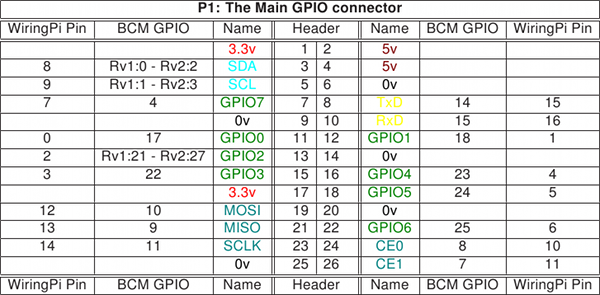 flasing
dpavlin@blue:~/Arduino/RF433_Sockets$ scp /tmp/build*.tmp/*.hex pi@rpi.tv:/tmp/
RF433_Sockets.cpp.hex 100% 19KB 18.6KB/s 00:00
pi@raspberrypi ~ $ cat avrdude.sh
#!/bin/sh
hex=`ls -t /tmp/*.hex | head -1`
echo "flash hex: $hex"
sudo /home/pi/avrdude-rpi/avrdude-autoreset -C /home/pi/avrdude.conf -v -v -patmega328p -carduino -P/dev/ttyAMA0 -b57600 -D -Uflash:w:$hex:i
pi@raspberrypi ~ $ ./avrdude.sh
flash hex: /tmp/RF433_Sockets.cpp.hex
avrdude: Version 6.1, compiled on Sep 17 2014 at 05:41:35
Copyright (c) 2000-2005 Brian Dean, http://www.bdmicro.com/
Copyright (c) 2007-2014 Joerg Wunsch
System wide configuration file is "/home/pi/avrdude.conf"
User configuration file is "/root/.avrduderc"
User configuration file does not exist or is not a regular file, skipping
Using Port : /dev/ttyAMA0
Using Programmer : arduino
Overriding Baud Rate : 57600
done with autoreset
strace: |/home/pi/avrdude-rpi/autoreset: Broken pipe
strace: |/home/pi/avrdude-rpi/autoreset: Broken pipe
AVR Part : ATmega328P
Chip Erase delay : 9000 us
PAGEL : PD7
BS2 : PC2
RESET disposition : dedicated
RETRY pulse : SCK
serial program mode : yes
parallel program mode : yes
Timeout : 200
StabDelay : 100
CmdexeDelay : 25
SyncLoops : 32
ByteDelay : 0
PollIndex : 3
PollValue : 0x53
Memory Detail :
Block Poll Page Polled
Memory Type Mode Delay Size Indx Paged Size Size #Pages MinW MaxW ReadBack
----------- ---- ----- ----- ---- ------ ------ ---- ------ ----- ----- ---------
eeprom 65 20 4 0 no 1024 4 0 3600 3600 0xff 0xff
flash 65 6 128 0 yes 32768 128 256 4500 4500 0xff 0xff
lfuse 0 0 0 0 no 1 0 0 4500 4500 0x00 0x00
hfuse 0 0 0 0 no 1 0 0 4500 4500 0x00 0x00
efuse 0 0 0 0 no 1 0 0 4500 4500 0x00 0x00
lock 0 0 0 0 no 1 0 0 4500 4500 0x00 0x00
calibration 0 0 0 0 no 1 0 0 0 0 0x00 0x00
signature 0 0 0 0 no 3 0 0 0 0 0x00 0x00
Programmer Type : Arduino
Description : Arduino
Hardware Version: 2
Firmware Version: 1.16
Vtarget : 0.0 V
Varef : 0.0 V
Oscillator : Off
SCK period : 0.1 us
avrdude: AVR device initialized and ready to accept instructions
Reading | ################################################## | 100% 0.01s
avrdude: Device signature = 0x1e950f
avrdude: safemode: lfuse reads as 0
avrdude: safemode: hfuse reads as 0
avrdude: safemode: efuse reads as 0
avrdude: reading input file "/tmp/RF433_Sockets.cpp.hex"
avrdude: writing flash (6770 bytes):
Writing | ################################################## | 100% 1.98s
avrdude: 6770 bytes of flash written
avrdude: verifying flash memory against /tmp/RF433_Sockets.cpp.hex:
avrdude: load data flash data from input file /tmp/RF433_Sockets.cpp.hex:
avrdude: input file /tmp/RF433_Sockets.cpp.hex contains 6770 bytes
avrdude: reading on-chip flash data:
Reading | ################################################## | 100% 1.49s
avrdude: verifying ...
avrdude: 6770 bytes of flash verified
avrdude: safemode: lfuse reads as 0
avrdude: safemode: hfuse reads as 0
avrdude: safemode: efuse reads as 0
avrdude: safemode: Fuses OK (E:00, H:00, L:00)
strace: |/home/pi/avrdude-rpi/autoreset: Broken pipe
strace: |/home/pi/avrdude-rpi/autoreset: Broken pipe
strace: |/home/pi/avrdude-rpi/autoreset: Broken pipe
strace: |/home/pi/avrdude-rpi/autoreset: Broken pipe
strace: |/home/pi/avrdude-rpi/autoreset: Broken pipe
avrdude done. Thank you.
strace: |/home/pi/avrdude-rpi/autoreset: Broken pipe
DS1307 Tiny RTC
Check if module has 5V pull-up I2C resistors! If it does (like Tiny RTC has R2 and R3) you will have to remove them. 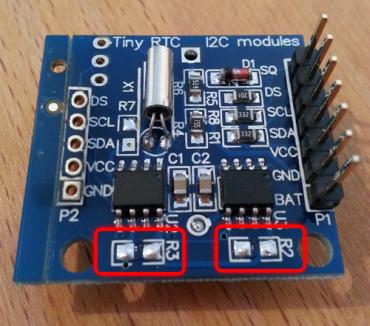
root@raspberrypi:/home/pi# apt-get install i2c-tools
root@raspberrypi:/home/pi# modprobe i2c-dev
root@raspberrypi:/home/pi# i2cdetect -y 1
0 1 2 3 4 5 6 7 8 9 a b c d e f
00: -- -- -- -- -- -- -- -- -- -- -- -- --
10: -- -- -- -- -- -- -- -- -- -- -- -- -- -- -- --
20: -- -- -- -- -- -- -- -- -- -- -- -- -- -- -- --
30: -- -- -- -- -- -- -- -- -- -- -- -- -- -- -- --
40: -- -- -- -- -- -- -- -- -- -- -- -- -- -- -- --
50: 50 -- -- -- -- -- -- -- -- -- -- -- -- -- -- --
60: -- -- -- -- -- -- -- -- 68 -- -- -- -- -- -- --
70: -- -- -- -- -- -- -- --
root@raspberrypi:/home/pi# modprobe rtc-ds1307
root@raspberrypi:/home/pi# echo ds1307 0x68 > /sys/class/i2c-adapter/i2c-1/new_device
root@raspberrypi:/home/pi# hwclock --systohc -D --noadjfile --utc
hwclock from util-linux 2.20.1
Using /dev interface to clock.
Assuming hardware clock is kept in UTC time.
Time elapsed since reference time has been 0.722720 seconds.
Delaying further to reach the new time.
Setting Hardware Clock to 11:53:41 = 1429876421 seconds since 1969
ioctl(RTC_SET_TIME) was successful.
DS18B20root@raspberrypi:/home/pi# grep w1 /boot/config.txt dtoverlay=w1-gpio # reboot root@raspberrypi:/home/pi# cat /sys/bus/w1/devices/28-0000043c5507/w1_slave 50 05 4b 46 7f ff 0c 10 1c : crc=1c YES 50 05 4b 46 7f ff 0c 10 1c t=85000 Hmm, you will also want to remove R1 pullup to make it work? avrdudeUsing Raspberry Pi as Arduino ISP programmer root@raspberrypi:/home/pi# avrdude -c linuxgpio -p atmega328p avrdude: AVR device initialized and ready to accept instructions Reading | ################################################## | 100% 0.00s avrdude: Device signature = 0x1e950f avrdude: safemode: Fuses OK (E:05, H:DA, L:FF) avrdude done. Thank you. logic analyzer
rotary encoderhttp://www.bobrathbone.com/raspberrypi_rotary.htm SWD
http://www.disk91.com/2015/technology/programming/swd-programming-using-a-raspberrypi/ pi@raspberrypi ~ $ git clone https://github.com/disk91/PySWD pi@raspberrypi ~ $ cd PySWD/ PIC
esp8089PS/2 GPIOGPIO header annotationsSignal generatorpi@rpi2 ~/WsprryPi $ sudo ./wspr --test-tone 1000000 A test tone will be generated at frequency 1.000000 MHz Using local mbox device file with major 249. Transmitting test tone on frequency 1.000000 MHz Press CTRL-C to exit! LCD panelshttp://blog.reasonablycorrect.com/raw-dpi-raspberry-pi/ Pi Zero USB OTGlibcomposite PATA IDE emulationDPI LCD screen
i2c clock stretchinglinks
infoWIFI Adapter Memory Card TF Micro-SD to CF Compact Flash Card Kit for Digit Y8X8
Insert your Micro-SD HC card into WiFi CF adapter and you can access high quality photos and videos sent wirelessly from your camera via Wi-Fi to your Smartphone or tablet to share. Welcome to my new unsorted stuff site. If you are here to learn about rot13 this might not be the right place. If you are, however looking latest and/or unsorted snippets which didn't made to my homepage or blog you might be on right place. Recent changes are best way to get a hang of what's going on.
PICKit 2pk2cmdpi@rpi2 ~ $ git clone https://github.com/psmay/pk2cmd pi@rpi2 ~ $ cd pk2cmd/pk2cmd pi@rpi2 ~/pk2cmd/pk2cmd $ make linux pi@rpi2 ~/pk2cmd/pk2cmd $ ./pk2cmd -P Auto-Detect: Found part PIC16F684. # power on target from pickit 2 pi@rpi2 ~/pk2cmd/pk2cmd $ ./pk2cmd -PPIC16F684 -T serialOriginal from CCC, let's try to compile with sdcc for it. https://events.ccc.de/camp/2007/Fahrplan/attachments/1337-Sputnik%20Slides The OpenBeacon Tag consists of
nRF24L01 2.4GHz transceiver (1/2MBps)
SchematicsOpenBeacon.pdfpinout(same as pickit)
1 VPP/RA3 (Square pin) PicKit 2pi@rpi2 ~ $ git clone https://github.com/psmay/pk2cmd pi@rpi2 ~ $ cd pk2cmd/pk2cmd pi@rpi2 ~/pk2cmd/pk2cmd $ make linux pi@rpi2 ~/pk2cmd/pk2cmd $ ./pk2cmd -P Auto-Detect: Found part PIC16F684. # power on target of pickit 2 which is sputlink tag pi@rpi2 ~/pk2cmd/pk2cmd $ ./pk2cmd -PPIC16F684 -T Sourcedpavlin@klin:/rest/cvs$ git clone https://github.com/meriac/openbeacon archival linkscalibrationhttps://github.com/steve-m/kalibrate-rtl
dpavlin@nuc:/nuc/kalibrate-rtl$ ./src/kal -s GSM900
Found 1 device(s):
0: Terratec T Stick PLUS
Using device 0: Terratec T Stick PLUS
Found Elonics E4000 tuner
Exact sample rate is: 270833.002142 Hz
kal: Scanning for GSM-900 base stations.
GSM-900:
chan: 53 (945.6MHz - 14.311kHz) power: 873627.18
chan: 61 (947.2MHz - 14.203kHz) power: 5086424.19
chan: 69 (948.8MHz - 14.217kHz) power: 925674.55
chan: 82 (951.4MHz - 14.368kHz) power: 1267065.47
chan: 89 (952.8MHz - 14.430kHz) power: 914349.18
chan: 99 (954.8MHz - 14.352kHz) power: 902132.81
chan: 105 (956.0MHz - 14.380kHz) power: 990434.19
chan: 108 (956.6MHz - 14.350kHz) power: 2682914.97
dpavlin@nuc:/nuc/kalibrate-rtl$ ./src/kal -c 61
Found 1 device(s):
0: Terratec T Stick PLUS
Using device 0: Terratec T Stick PLUS
Found Elonics E4000 tuner
Exact sample rate is: 270833.002142 Hz
kal: Calculating clock frequency offset.
Using GSM-900 channel 61 (947.2MHz)
average [min, max] (range, stddev)
- 14.238kHz [-14257, -14220] (37, 8.682419)
overruns: 0
not found: 0
average absolute error: 15.032 ppm
dpavlin@nuc:/nuc/kalibrate-rtl$ ./src/kal -c 61
Found 2 device(s):
0: Generic RTL2832U OEM
1: Terratec T Stick PLUS
Using device 0: Generic RTL2832U OEM
Found Fitipower FC0012 tuner
Exact sample rate is: 270833.002142 Hz
kal: Calculating clock frequency offset.
Using GSM-900 channel 61 (947.2MHz)
average [min, max] (range, stddev)
- 36.021kHz [-36032, -36011] (21, 5.899949)
overruns: 0
not found: 0
average absolute error: 38.028 ppm
DVB-T Digital TV Receiver USB Dongle w/ FM / Remote Control / Antenna - Blackhttp://dx.com/p/dvb-t-digital-tv-receiver-usb-dongle-w-fm-remote-control-antenna-black-149928 dpavlin@blue:~$ lsusb | grep DVB Bus 001 Device 007: ID 0bda:2838 Realtek Semiconductor Corp. RTL2838 DVB-T dpavlin@blue:~$ sudo rtl_test -t [sudo] password for dpavlin: Found 1 device(s): 0: ezcap USB 2.0 DVB-T/DAB/FM dongle Using device 0: ezcap USB 2.0 DVB-T/DAB/FM dongle Found Rafael Micro R820T tuner Supported gain values (29): 0.0 0.9 1.4 2.7 3.7 7.7 8.7 12.5 14.4 15.7 16.6 19.7 20.7 22.9 25.4 28.0 29.7 32.8 33.8 36.4 37.2 38.6 40.2 42.1 43.4 43.9 44.5 48.0 49.6 No E4000 tuner found, aborting. dpavlin@blue:/blue/rtl-sdr/rtl-sdr/build$ sudo rtl_tcp Found 1 device(s). Found Rafael Micro R820T tuner Using ezcap USB 2.0 DVB-T/DAB/FM dongle Tuned to 100000000 Hz. listening... Use the device argument 'rtl_tcp=127.0.0.1:1234' in OsmoSDR (gr-osmosdr) source to receive samples in GRC and control rtl_tcp parameters (frequency, gain, ...). E4000+2832U USB DVB-T TV Receiver Stickhttp://dx.com/p/e4000-2832u-usb-dvb-t-tv-receiver-stick-white-black-172105 dpavlin@blue:~$ rtl_test -t Found 1 device(s): 0: Terratec T Stick PLUS Using device 0: Terratec T Stick PLUS Found Elonics E4000 tuner Supported gain values (14): -1.0 1.5 4.0 6.5 9.0 11.5 14.0 16.5 19.0 21.5 24.0 29.0 34.0 42.0 Benchmarking E4000 PLL... [E4K] PLL not locked for 52000000 Hz! [E4K] PLL not locked for 2227000000 Hz! [E4K] PLL not locked for 1114000000 Hz! [E4K] PLL not locked for 1274000000 Hz! E4K range: 53 to 2226 MHz E4K L-band gap: 1114 to 1274 MHz Hama 53176
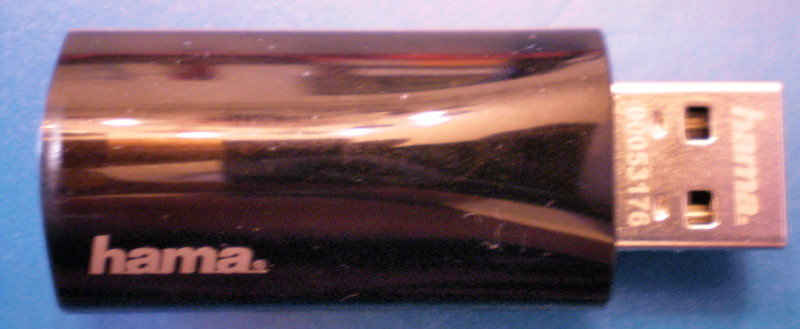 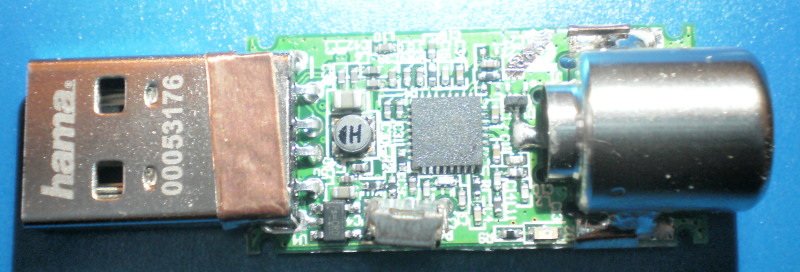 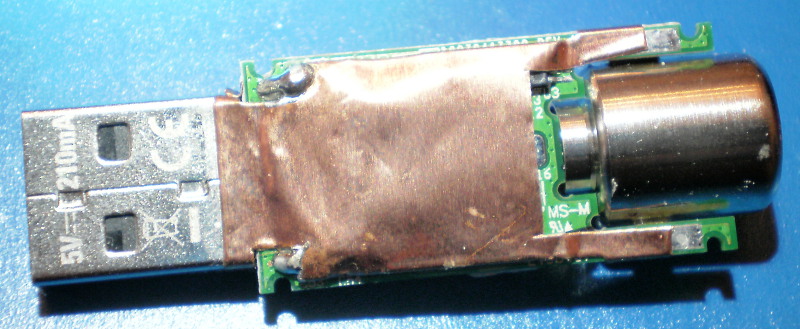 TV LV5TDLX
   see also rtl-sdr for receiver part dpavlin@nuc:~$ lsusb -d 1d5c:2000 Bus 003 Device 007: ID 1d5c:2000 dpavlin@nuc:~$ sudo fl2k_test -s 162e6 [sudo] password for dpavlin: Using 6 zero-copy buffers libusb: error [op_dev_mem_alloc] alloc dev mem failed errno 12 Failed to allocate zerocopy buffer for transfer 4 Reporting PPM error measurement every 10 seconds... Press ^C after a few minutes. real sample rate: 144376742 current PPM: -108786 cumulative PPM: -108786 real sample rate: 144270861 current PPM: -109439 cumulative PPM: -109125 real sample rate: 144227755 current PPM: -109705 cumulative PPM: -109323 ^CSignal caught, exiting! pinout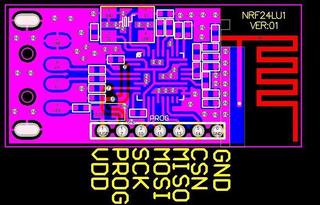 It seems that v2.0 devies are 32k while Internet wants us to beleve that they are 16k (v1.0 maybe?) original firmware output[11985.181504] usb 2-2.1: new full-speed USB device number 7 using xhci_hcd [11985.285687] usb 2-2.1: New USB device found, idVendor=1915, idProduct=002b [11985.285690] usb 2-2.1: New USB device strings: Mfr=1, Product=2, SerialNumber=3 [11985.285692] usb 2-2.1: Product: Nordic Semiconductor nRFready Basic Remote Dongle [11985.285694] usb 2-2.1: Manufacturer: Nordic Semiconductor [11985.285695] usb 2-2.1: SerialNumber: \xffffffef\xffffffbf\xffffffbf\xffffffef\xffffffbf\xffffffbf\xffffffef\xffffffbf\xffffffbf\xffffffef\xffffffbf\xffffffbf\xffffffef\xffffffbf\xffffffbf\xffffffef\xffffffbf\xffffffbf\xffffffef\xffffffbf\xffffffbf\xffffffef\xffffffbf\xffffffbf\xffffffef\xffffffbf\xffffffbf\xffffffef\xffffffbf\xffffffbf [11985.301719] input: Nordic Semiconductor Nordic Semiconductor nRFready Basic Remote Dongle as /devices/pci0000:00/0000:00:14.0/usb2/2-2/2-2.1/2-2.1:1.0/0003:1915:002B.0005/input/input11 [11985.361937] hid-generic 0003:1915:002B.0005: input,hiddev0,hidraw2: USB HID v1.11 Keyboard [Nordic Semiconductor Nordic Semiconductor nRFready Basic Remote Dongle] on usb-0000:00:14.0-2.1/input0 mouse jack toolshttps://github.com/BastilleResearch/mousejack find device addressdpavlin@nuc:/nuc/nRF24L01/mousejack/nrf-research-firmware/tools$ ./nrf24-scanner.py [2017-01-07 13:50:59.174] 12 0 65:6F:91:A9:07 [2017-01-07 13:51:07.012] 8 10 65:6F:91:A9:07 00:C2:00:00:F8:FF:FE:00:00:49 [2017-01-07 13:51:15.216] 8 10 65:6F:91:A9:07 00:C2:00:00:17:D0:FF:00:00:58 [2017-01-07 13:51:15.231] 8 0 65:6F:91:A9:07 [2017-01-07 13:51:15.698] 12 0 65:6F:91:A9:07 [2017-01-07 13:51:23.456] 8 10 65:6F:91:A9:07 00:C2:00:00:EB:BF:FF:00:00:95 [2017-01-07 13:51:23.503] 8 10 65:6F:91:A9:07 00:C2:00:00:FF:0F:FF:00:00:31 [2017-01-07 13:51:23.509] 8 0 65:6F:91:A9:07 [2017-01-07 13:51:23.840] 12 0 65:6F:91:A9:07 sniffdpavlin@nuc:/nuc/nRF24L01/mousejack/nrf-research-firmware/tools$ ./nrf24-sniffer.py -c 8 12 -a 65:6F:91:A9:07 [2017-01-07 13:53:34.922] 8 5 65:6F:91:A9:07 00:40:00:08:B8 [2017-01-07 13:53:34.930] 8 5 65:6F:91:A9:07 00:40:00:08:B8 [2017-01-07 13:53:34.938] 8 5 65:6F:91:A9:07 00:40:00:08:B8 [2017-01-07 13:53:34.946] 8 5 65:6F:91:A9:07 00:40:00:08:B8 [2017-01-07 13:53:34.962] 8 5 65:6F:91:A9:07 00:40:00:08:B8 [2017-01-07 13:53:34.970] 8 5 65:6F:91:A9:07 00:40:00:08:B8 [2017-01-07 13:53:34.979] 8 22 65:6F:91:A9:07 00:D3:44:0F:5C:E6:CD:54:B5:71:8C:F9:99:33:00:00:00:00:00:00:00:00 [2017-01-07 13:53:34.986] 8 5 65:6F:91:A9:07 00:40:00:08:B8 [2017-01-07 13:53:34.994] 8 10 65:6F:91:A9:07 00:4F:00:01:18:00:00:00:00:98 [2017-01-07 13:53:35.125] 8 5 65:6F:91:A9:07 00:40:01:18:A7 [2017-01-07 13:53:35.278] 8 22 65:6F:91:A9:07 00:D3:B0:F4:B3:27:E3:BE:34:72:8C:F9:99:34:00:00:00:00:00:00:00:16 [2017-01-07 13:53:35.285] 8 5 65:6F:91:A9:07 00:40:00:08:B8 [2017-01-07 13:53:35.301] 8 5 65:6F:91:A9:07 00:40:00:08:B8 flashing
https://github.com/BastilleResearch/mousejack/issues/6 bus piratehttps://github.com/koolatron/buspirate_nrf24lu1p
dpavlin@nuc:/nuc/nRF24L01/buspirate_nrf24lu1p$ ./flasher.pl -device /dev/ttyUSB0 -input ../mousejack/nrf-research-firmware/bin/dongle.bin bootloader512 byte replacementhttps://github.com/ahtn/nrf24lu1p-512-bootloader original bootloaderhttps://github.com/al177/buspirate_nrf24lu1p Logitech C-U0007Version with fixed ctrl+c exit bug: https://github.com/cl0udz/mousejack dpavlin@x230:/x230/mousejack$ git remote -v cl0udz https://github.com/cl0udz/mousejack (fetch) cl0udz https://github.com/cl0udz/mousejack (push) dpavlin@x230:/x230/mousejack/nrf-research-firmware$ make logitech_install [Fri Apr 27 22:10:16 2018] usb 1-1.2: new full-speed USB device number 23 using ehci-pci [Fri Apr 27 22:10:16 2018] usb 1-1.2: New USB device found, idVendor=1915, idProduct=0102 [Fri Apr 27 22:10:16 2018] usb 1-1.2: New USB device strings: Mfr=1, Product=2, SerialNumber=0 [Fri Apr 27 22:10:16 2018] usb 1-1.2: Product: Research Firmware [Fri Apr 27 22:10:16 2018] usb 1-1.2: Manufacturer: RFStorm dpavlin@x230:/x230/mousejack/nrf-research-firmware$ ./tools/nrf24-scanner.py [2018-04-29 14:23:51.370] 5 22 65:6F:91:A9:07 00:D3:D5:D7:4F:76:ED:63:55:70:EC:77:61:0F:00:00:00:00:00:00:00:D4 [2018-04-29 14:23:51.786] 9 5 65:6F:91:A9:07 00:40:00:08:B8
update vid and pid in compiled binarysince version 1.2.8 you need to insert vid and pid into the binary by running make build/gnuk-vidpid.elf and than flash the resulting gnuk-vidpid.bin binary into your FST-01 SWD flashing using ST Link v2usb 1-1.6.4: new full-speed USB device number 16 using ehci-pci usb 1-1.6.4: New USB device found, idVendor=0483, idProduct=3748 usb 1-1.6.4: New USB device strings: Mfr=1, Product=2, SerialNumber=3 usb 1-1.6.4: Product: STM32 STLink usb 1-1.6.4: Manufacturer: STMicroelectronics usb 1-1.6.4: SerialNumber: Qÿl^FH<85>PH'Q^C<87>
Problem:
dpavlin@blue:/blue-zfs/STM32/FST-01/gnuk/tool$ ./stlinkv2.py -s
ST-Link/V2 version info: 2 17 4
Change ST-Link/V2 mode 0002 -> 0001
CORE: 0de01477, CHIP_ID: 00000000
Flash ROM read protection: off
Option bytes: 00000000
Core does not halt, try API V2 halt.
ValueError('Status of core is not halt.', 128)
after several re-runs:
dpavlin@blue:/blue-zfs/STM32/FST-01/gnuk/tool$ ./stlinkv2.py -s
ST-Link/V2 version info: 2 17 4
Change ST-Link/V2 mode 0002 -> 0001
CORE: 1ba01477, CHIP_ID: a0036410
Flash ROM read protection: off
Option bytes: a0036410
Core does not halt, try API V2 halt.
ValueError('Status of core is not halt.', 128)
after a bit of fiddling with cables (it's always cables, right?) Lovro contributed that if you are getting continous output like this
ST-Link/V2 version info: 2 17 4
Change ST-Link/V2 mode 0002 -> 0001
Core does not halt, try API V2 halt.
ValueError('Status of core is not halt.', 128)
then run this while holding reset active (hold tweezers on both side of C3) dpavlin@blue:/blue-zfs/STM32/FST-01/gnuk$ sudo ./tool/stlinkv2.py -s ST-Link/V2 version info: 2 17 4 Change ST-Link/V2 mode 0002 -> 0001 CORE: 1ba01477, CHIP_ID: 20036410 Flash ROM read protection: ON Option bytes: 03fffffe The MCU is now stopped. SUCCESS dpavlin@blue:/blue-zfs/STM32/FST-01/gnuk$ sudo ./tool/stlinkv2.py -u ST-Link/V2 version info: 2 17 4 Change ST-Link/V2 mode 0002 -> 0001 Status is 0081 CORE: 1ba01477, CHIP_ID: 20036410 Flash ROM read protection: ON Option bytes: 03fffffe Flash ROM read protection disabled. Reset the board, now. SUCCESS # plugin, plugout st-link/v2 dpavlin@blue:/blue-zfs/STM32/FST-01/gnuk$ sudo ./tool/stlinkv2.py -s ST-Link/V2 version info: 2 17 4 Change ST-Link/V2 mode 0100 -> 0001 CORE: 1ba01477, CHIP_ID: 20036410 Flash ROM read protection: off Option bytes: ffff5aa5 Flash ROM blank check: True SUCCESS dpavlin@blue:/blue-zfs/STM32/FST-01/gnuk$ sudo ./tool/stlinkv2.py -b ../binaries/gnuk/gnuk.bin ST-Link/V2 version info: 2 17 4 Change ST-Link/V2 mode 0001 -> 0001 CORE: 1ba01477, CHIP_ID: 20036410 Flash ROM read protection: off Option bytes: ffff5aa5 Flash ROM blank check: True SPI Flash ROM ID: bf254a WRITE VERIFY PROTECT Flash ROM read protection enabled. Reset the board to enable protection. SUCCESS # power cycle dpavlin@blue:/blue-zfs/STM32/FST-01/gnuk$ sudo ./tool/stlinkv2.py -s ST-Link/V2 version info: 2 17 4 Change ST-Link/V2 mode 0100 -> 0001 CORE: 1ba01477, CHIP_ID: 20036410 Flash ROM read protection: ON Option bytes: 03fffffe The MCU is now stopped. SUCCESS plugin just FST-01: [ 9890.019368] usb 1-1.6.4: New USB device found, idVendor=234b, idProduct=0000 [ 9890.019372] usb 1-1.6.4: New USB device strings: Mfr=1, Product=2, SerialNumber=3 [ 9890.019374] usb 1-1.6.4: Product: Gnuk Token [ 9890.019375] usb 1-1.6.4: Manufacturer: Free Software Initiative of Japan [ 9890.019377] usb 1-1.6.4: SerialNumber: FSIJ-1.0.4-50FF7006 |
Weblog Archives
|

